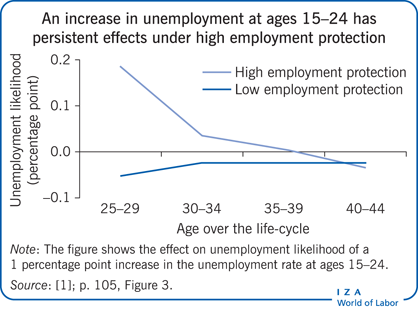Elevator pitch
The Great Recession that began in 2008–2009 dramatically increased youth unemployment. But did it have long-lasting, adverse effects on the careers of youths? Are cohorts that graduate during a recession doomed to fall permanently behind those that graduate at other times? Are the impacts different for low- and high-educated individuals? If recessions impose penalties that persist over time, then more government outlays are justified to stabilize economic activity. Scientific evidence from a variety of countries shows that rigid labor markets can reinforce the persistence of these setbacks, which has important policy implications.

Key findings
Pros
High-educated youth graduating during a recession incur a moderate, but long-lasting loss in earnings.
High-educated youth get locked into lower-quality jobs, especially in rigid labor markets.
Strict employment protection legislation and other rigid worker protections induce more unemployment and reinforce the persistency of losses.
Low employment protection for fixed-term contracts and high employment protection for regular contracts increase the likelihood of unemployment and churning between short-term jobs.
Cons
The earnings of low-educated youth entering the labor market in a recession fall considerably in the short-term, but the penalty dissipates quickly.
High-educated unlucky cohorts can eventually catch up if the labor market is sufficiently flexible.
A high minimum wage shields low-skilled youth against a wage penalty, while other worker protections reduce immediate negative impacts on employment and hours worked.
High-educated youth are less affected in terms of employment and hours worked, irrespective of labor market flexibility.